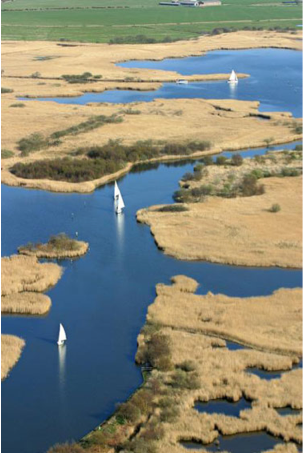Lost island to be restored
An innovative scheme to restore a lost island near Hickling Broad using dredgings from a nearby navigation channel has been approved by the Broads Authority’s Planning Committee.
About 300 steel baskets standing on the bed of Duck Broad and lined with polyethylene bags will be filled with mud dredged from Heigham Sound to form the perimeter of the island. The void in the middle will be filled with more mud from the river bed and the island will then be planted with reed.
The planning approval will enable the long-awaited dredging of Heigham Sound to go ahead.
Difficulties in finding mud disposal sites in the area have prevented the dredging of the navigation channel which has silted up to a depth of 90cm in places, causing some traditional Broads sailing boats to go aground. Silt which has gathered on the river bed over time will now be removed to a depth of 1.5 metres.
Rob Savage, Broads Authority Rivers Engineer, who devised the scheme, said: “We have explored every option for dredging disposal on Heigham Sound and Hickling Broad over the last few years and this seems to be the only option available currently.”
The Broads Authority has designed and built the 2m high cages based on wire baskets which have been used by the British Army as barricades in Afghanistan. Two successful trials of the baskets have already been run in areas in soke dykes.
The proposal is for the island to be built in two stages, with work on a trial island of 20m x 20m to begin in May this year. If successful the island will be extended to 40m wide by 250m long, after full consultation with Natural England, the Environment Agency and angling groups.
During the work stability and reed growth will be carefully monitored and the water quality tested on a weekly basis for any outbreak of the algae Prymnesium parvum which at certain times releases toxins which can kill fish. Fish and birds will also be closely monitored. A fish rescue plan will be in place before any work starts.
Rob Rogers, Head of Construction and Facilities, said historically there had been no connection between dredging and an outbreak of Prymnesium parvam. Intermittent outbreaks between 1970 and 2000 had occurred without any dredging activity, and when Catfield Dyke, off Hickling Broad, was dredged in 2002 there was no Prymnesium outbreak. He pointed out the algae lives in the water, not the mud, so it would not necessarily be disturbed by dredging.
“With weekly monitoring we would hope to notice an increase in Prymnesium parvum long before we see any fish deaths,” he said. “A fish action plan is being put in place now by the Environment Agency and Broads Authority.”
Planning and Navigation Committee member Martin Broom pointed out that dredging was part of the Broads Authority’s remit and it did not need planning permission to dredge. If disposal sites could have been found the dredging of Heigham Sound would have been completed by now.
“This is an imaginative way of disposing of the dredgings in a local area,” he said.




